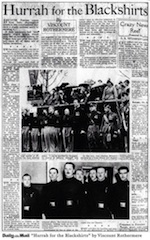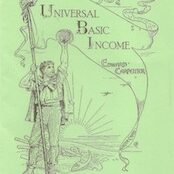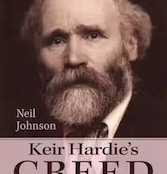The Daily Mail’s recent claims about Ed Miliband’s father made headline news for more than a week. This article from the POUMISTA website comprehensively destroys the paper’s case.
The Daily Mail has been in the news for its attacks on Ralph Miliband as “the man who hated Britain”. This continues a long tradition of smearing ‘Red’ Ed Miliband by association with his father’s politics (here, for instance, in 2010, they make a big deal of the fact that his elderly cousin, who he may not even have met, had some vague connection to Joseph Stalin half a century ago).
Was Miliband anti-British?
The sole piece of evidence presented by the Mail of Miliband Sr’s “hatred of Britain” is a diary entry he wrote when he was 17. I pity my son, if he ever becomes a public figure and the Mail finds what I wrote in my diaries as a teenager… I would much rather trust his son’s memories to know anything about what the mature man actually felt about the land that gave him refuge when he fled genocide – and the land for which he served in the armed forces.
Ralph Miliband fought for Britain in the war against fascism. According to his Independent obit:
“The three missing years to which he refers were spent in service as a naval rating in the Belgian section of the Royal Navy. Aware of the fact that many of his Belgian comrades were engaged in the war against Fascism and traumatised by the absence of his mother and sister, he had volunteered, using Laski’s influence to override the bureaucracy.
“He served on a number of destroyers and warships, helping to intercept German radio messages. He rose to the rank of Chief Petty Officer and was greatly amused on one occasion when his new commanding officer informed him how he had been rated by a viscount who had commanded the ship on which he had previously served: ‘Miliband is stupid, but always remains cheerful.’”
However, I’m fairly sure that despite his lack of British nationality at this point, he served in the mainstream Royal Navy and not in the Section Belge (RNSB). The latter operated corvettes and minesweepers, while Miliband served on destroyers and warships.
Was Miliband a Communist Fellow Traveller?
The Mail article makes a good deal of Harold Laski’s influence on Ralph Miliband:
“At the London School of Economics, he was taught and heavily influenced by the extremist Left-winger Harold Laski, who said the use of violence was legitimate in British elections.”
I see Laski, although far from “an extreme Left-winger”, as a broadly pernicious figure in British political history, and as something of a fellow traveller. But it is important to be clear about timing. Laski was broadly committed to a liberal, reformist, parliamentary social democracy until the early 1930s, and was close to the right-wing Labour leader Ramsay MacDonald. (Aside: MacDonald’s previous government in 1924 was brought down partly as a result of the Mail‘s publication of the forged Zinoviev letter, alleging Soviet interference with British politics – first in a long-line of dishonest anti-Communist smears directed at Labour from the paper.)
Only in the 1930s, during the tumultuous years of the Depression, did Laski start to flirt with a pro-Soviet position, and come to believe that the overthrow of capitalism might not happen peacefully. Even in this period, I am fairly certain, he never said “the use of violence was legitimate in British elections”, as the Mail claims.
During 1931-1937 Laski was a key figure in the Popular Frontist movement in British politics, influenced by Laski’s friend Leon Blum in France. This movement, including Stafford Cripps and focused around the small middle-class Socialist League, as well as the more broad-based Left Book Club, sought rapprochement between the Labour movement and Communism, with the priority of defeating fascism. This movement was largely rejected both by the working class mainstream of the Labour Party and by the uncompromising anti-Stalinists of the Independent Labour Party, and Laski skunked back to Labour in 1937, increasingly settling in on the soft left of the party.
After the war, Laski did continue to argue for a more positive attitude towards Britain’s war-time Soviet allies and against the Atlanticist Cold War consensus in the Labour Party, but he no longer endorsed Communism as a viable political movement in Britain. It was this later Laski who would influence the young Ralph Miliband, who studied under him at the LSE briefly during the war and then again after his demobilisation. This more mellow Laski encouraged Miliband to think for himself and question Marxist orthodoxy.
Was Miliband a Communist?
Ralph Miliband has been described as a Stalinist, which is a complete travesty considering his consistent opposition to the Soviet model of socialism from above. Back in Poland, Ralph Miliband’s father had been a Bundist, a fiercely anti-Stalinist Jewish socialist movement. As a youngster in Belgium he joined the Zionist youth group Hashomer Hatzair, which was affiliated to the British Independent Labour Party, and again anti-Stalinist.
He was never a member or supporter of the Communist Party; he was sympathetic to Tito’s Yugoslavia in the immediate post-war years, when it broke with the Stalinist bloc; and by the the 1950s when the New Left was starting to emerge from the shadow of orthodox Communism he was a fully fledged anti-Stalinist.
The Soviet crushing of democratic socialism in Hungary in 1956 and then in Czechoslovakia in 1968 repelled him deeply. In this period, as the Mail notes, he was friendly with the Stalinist Eric Hobsbawm, another refugee from fascism and ex-serviceman (in the Royal Engineers and the Royal Army Educational Corps), but, as the Mail passes over quickly, on this issue Miliband was sharply at odds with his friend. Here he is in 1968:
“The invasion of Czechoslovakia show very well that this oppressive and authoritarian Russian socialism has nothing in common with the socialism that we demand,and we must state this very loudly, even at the risk of seeming to be anti-soviet and to echo bourgeois propaganda … And then, there is also this question of ‘bourgeois liberties’ … which, I am persuaded, we must put at the top of our programme. Or rather, denounce them as insufficient and to be extended by socialism. Nothing will work if it is possible and plausible to suggest that we want to abolish them.
“And that is one of the reasons why the democratization of ‘revolutionary’ parties is essential… The internal life of a revolutionary party must prefigure the society which it wants to establish – by its mode of existence, and its way of being and acting. While this is not the case, I don’t see any reason to want to see the current parties take power: they are quite simply not morally ready to assume the construction of a socialist society.”
His anti-Stalinism was less robust than, for example EP Thompson’s became or that of the International Socialists, and there is a still a lingering presence of the Laski-ite fellow traveller in his sense that “seeming to be anti-Soviet” might be a bad thing, but he was always clear that ‘Soviet socialism’ was oppressive and cruel.
The only quotation the Mail comes up with in relation to Miliband’s attitude to the Soviet Union was this:
“Mikhail Gorbachev’s dismantling of Soviet socialism and the worker state should have shocked Miliband, but he managed to find an argument welcoming it.
“He proclaimed that the Cold War had always been a useful ‘bogey’ for the Right, and that, ‘the success of Mikhail Gorbachev in democratising Soviet society … would deprive conservative forces of one of their most effective weapons’.”
In fact, of course, that’s evidence of pretty much nothing: Gorbachev’s reforms were heartily welcomed by all who thought that the Soviet Union constituted ‘actually existing socialism’ while condemning its authoritarianism. Here’s Miliband in 1990:
“In recent years, Mikhail Gorbachev has sought with great eloquence to define the kind of internationalism which the world requires today, and has done so in terms of universal values and aspirations, beyond boundaries of nations, classes and creeds – values and aspirations relating to peace, disarmament, the protection of the environment, and so on. These are indeed universal values, and socialists obviously subscribe to them.
“…the collapse of Communist regimes in Eastern Europe (and its likely collapse elsewhere) clearly constitutes a great strengthening of the hope nurtured by conservative forces that the world might be shaped (or re-shaped) in an image acceptable to them. There is now a very good chance that some Communist countries at least will move towards the restoration of capitalism: some of them are already well advanced on that road…
“Such celebration and proclamation is, however, rather premature. Soviet-type Communism, with the centrally planned command economy and the monopolistic one-party political system, is out or on the way out, and will not be resurrected. But the notion that this is the end of socialist striving and eventual socialist advances leaves a vital fact out of account. This is that, despite the current apotheosis of capitalism, it has resolved none of the problems which give sustenance to socialist aspirations and struggles. Given the inherent and ineradicable failings of capitalism, there is no reason to doubt that the striving for radical alternatives will continue.”
Miliband was wrong to see that the Soviet regime ever (except perhaps briefly in the last two months of 1917) represented any kind of hopeful alternative to Western market capitalism, but he was always a sharp critic of its oppressiveness.
And what about the Daily Mail?
The Mail article mentions Miliband’s ‘immigrant’ status (they don’t use the more accurate word ‘refugee’) a few times:
“This was the immigrant boy whose first act in Britain was to discard his name Adolphe because of its associations with Hitler, and become Ralph, and who helped his father earn a living rescuing furniture from bombed houses in the Blitz.”
This will be no surprise for those of us familiar with the Mail’s fiercely anti-immigrant – and arguably xenophobic – politics. Only last year they said that the “only responsible vote” in the French elections was not for the Thatcherite Sarkozy, but the fascist Marine Le Pen! One of the by-products of this kerfuffle is to remind people that right up to the war, the Mail (under the father of the current proprietor, Viscount Rothermere), was consistently pro-fascist.
Lord Rothermere was a friend of Benito Mussolini and Adolf Hitler, and directed the Mail’s editorial stance towards them in the 1930s. Rothermere’s 1933 leader ‘Youth Triumphant’ praised the new Nazi regime’s accomplishments, and was subsequently used as propaganda by them. In it, Rothermere predicted that: “The minor misdeeds of individual Nazis would be submerged by the immense benefits the new regime is already bestowing upon Germany.”
 Journalist John Simpson, in a book on journalism, suggested that Rothermere was referring to the violence against Jews and Communists rather than the detention of political prisoners.
Journalist John Simpson, in a book on journalism, suggested that Rothermere was referring to the violence against Jews and Communists rather than the detention of political prisoners.
Rothermere and the Mail were also editorially sympathetic to Oswald Mosley and the British Union of Fascists. Rothermere wrote an article entitled ‘Hurrah for the Blackshirts’ in January 1934, praising Mosley for his “sound, commonsense, Conservative doctrine”. This support ended after violence at a BUF rally in Kensington Olympia later that year.
The pictured article (left) is just one example.
Rothermere, as late as 1939, wrote to Hilter congratulating him on invading Prague, and urged him to march on Romania.
—-
This article was published on the POUMISTA blog site on 1 October 2013.
Ed Miliband’s reply to the Mail, “Why my father loved Britain”, is here.



8 January 2014
[…] being branded ‘the man who hated Britain’ by the Daily Mail, Miliband’s socialist ideas have inspired renewed political debate. In order to challenge the […]
21 November 2013
[…] She featured on Channel 4 News, on the Guardian website, and in the Mirror newspaper, appearing at their ‘Real Britain’ anti-austerity event at Labour conference this September when she told Ed Miliband she’d been a fan of his dad, Ralph, the Marxist academic attacked by the Daily Mail. […]
5 November 2013
A belated thanks for the repost!